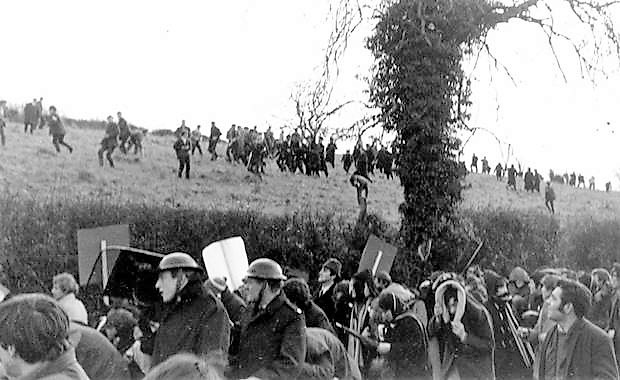7 January 2019
The 'Long March to Derry' - from civil rights to national rights
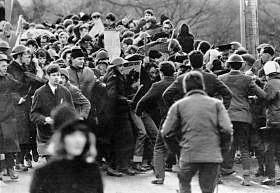
The attack at Burntollet Bridge.
It is a scandal that still fifty years after political extremists beat civil rights marchers from Belfast to Derry off the roads in opposition to a rights based society, a new generation of political unionists now continues to oppose the development of a rights based society and proper power sharing.
People's Democracy (PD) emerged as one of the constituent parts of the wider Civil Rights Movement (CRM) in the north of Ireland during the late 1960s.
It was a collective of radical students influenced like the rest of the emergent CRM by global events and motivated by a resolve to bring an end to the injustices of the then unionist state.
Inspired by the political example of the Selma to Montgomery march organised by the American CRM, the PD and notably without the approval of the wider CRM, decided to march from Belfast to Derry in a highly symbolic protest against the denial of democratic and civil rights in the north.
The march began on 1st January and eventually arrived in Derry on Saturday 4th January 1969. But, not before it was violently confronted by unionist extremists, supported by members of the B-Specials state militia, as it passed through Antrim town and Randalstown in South Antrim, and then most notoriously at Burntollet Bridge, outside Claudy; and finally again at Irish Street in Derry, before finally arriving at the city's Guildhall.
Whilst mainly comprised of students associated with PD, the march was joined by others on the route, and supported with overnight accommodation and refreshments by local communities, in places like Whitehill, between Antrim and Randalstown,
and Brackareilly, near Maghera.
Where the route of the march was blocked by unionists, local people provided transport to the next clear point on the journey.
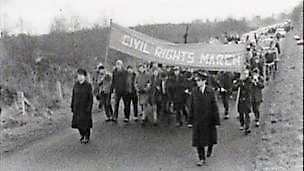
Among the numbers to join and support the marchers as it passed through South Antrim and South Derry were local republicans, including IRA volunteers and members of the then Republican Clubs; local Hibernians, social democrats, as well as other progressive minded people, who recognised the importance of the march, and respected those participating.
The 'Long March to Derry' as it came to be known made its own historic contribution to the demise of the old unionist regime in the north of Ireland.
So to mark this landmark event, fifty years on from the actual date of the ambush on the marchers at Burntollet, Sinn Féin in my South Antrim constituency organised an evening of reminiscence and political discussion, compered by the author and Sinn Féin's former Director of Publicity, Danny Morrison.
A specially produced video by Noel and Noel Óg Maguire was shown, sharing local people's eye witness accounts and recollections of what happened in Antrim, Randalstown, Toome, and also at Burntollet.
Civil rights veterans, and former Sinn Féin MLAs, Mary Nelis and Mitchel Mc Laughlin, and myself then participated in a panel discussion.
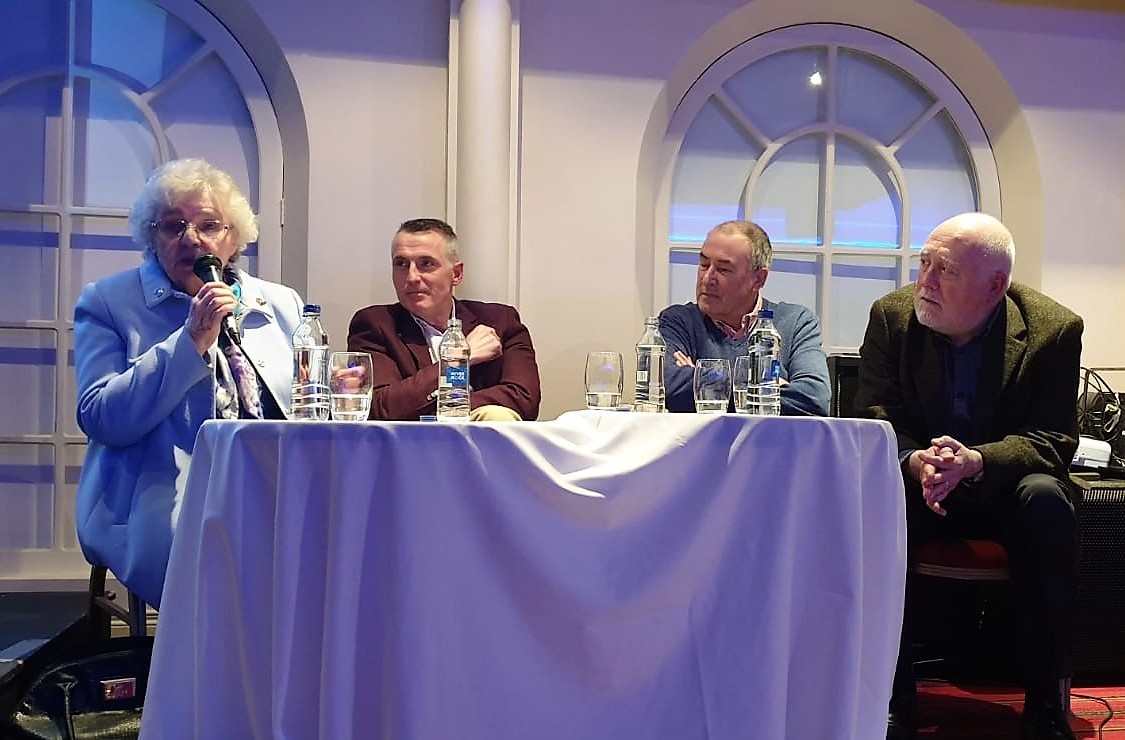
That reviewed the pre-civil rights period, how the CRM came into existence, and how the civil rights era gave way to the political conflict, leading up to the peace process, and the present day political situation.
It was an excellent event, with an audience spanning three or four generations from South Antrim and South Derry.
Some present were reconnecting with historical events which they helped shape, and which in turn shaped them: others were of an age to draw parallels between their own contemporary experiences of rights denied today with the denial of rights fifty years ago.
What the 'Long March to Derry' in 1969, and the sequence of other events of that same year, climaxing with the pogroms of August 1969, brought sharply into focus was that partition remained the central fault line at the heart of Irish politics and society: and, that the denial of civil rights in the north was, and remains indivisible from the denial of Irish national independence.
Following the RUC assault on the civil rights marchers in Duke Street, Derry, on 5th October 1968, the 'Long March to Derry' again exposed for a world audience the institutionalised sectrarianism of the northern state, and extent of unionist opposition to the equality and rights agenda.
The violence orchestrated by the unionist state and others, in denying the modest reforms sought by the CRM was the catalyst for a phase of renewed political conflict which consumed this island for the next thirty years.
Nothing would ever be the same again.
It took a further thirty years before the Good Friday Agreement (GFA) drew a line under the use of political violence; provided the political architecture of the Irish peace process; and, established in legislation equality and human rights for all citizens; in many ways the GFA addressed what the CRM did not resolve.
It gave expression with an internationally binding treaty to the crux of the CRM agenda, by establishing the bench marks of equality, rights, and respect for all citizens.
It became our society's road map away from the legacy of political violence towards the achievement of a rights based society, with parity of esteem, mutual respect and anti-sectarianism, at its core.
However, today that vision has still to be realised.
Both the British and Irish governments have failed to fully implement the GFA.
Just as the unionist state in 1969 opposed the CRM, significant sections of political unionism have pushed back against the GFA since 1998.
It is a scandal that still fifty years after political extremists beat civil rights marchers from Belfast to Derry off the roads in opposition to a rights based society, a new generation of political unionists now continues to oppose the development of a rights based society and proper power sharing.
And, that is the fundamental reason why the democratic political institutions in the north remain suspended; and why the GFA faces its greatest ever threat.
Make no mistake, there is a deep systemic crisis in the north of Ireland.
It is a crisis caused and perpetuated by a denial of democratic rights and a failure to implement the GFA.
Now that crisis is deepening with the onset of the Brexit catastrophe.
Brexit has swept away all of the previously established assumptions about the constitutional, political and economic status quo in Ireland north and south.
A solution to the depth of this crisis will only be found through negotiation and decisive political leadership, which commands the authority to make and keep agreements, and embrace and deliver change.
Bellicose, sabre rattling new year statements are no substitute for what is required of real leaders.
Those who marched from Belfast to Derry fifty years ago this week were a microcosm of the wider CRM.
They were students and others, including, republicans, social democrats, communists, socialists, trade unionists, and labour members. They were from different religious back grounds, and none.
The timeless lesson of the CRM which applies to our current situation is that the type of progressive alliances which stood up for rights in 1969 are still required today in 2019.
We need progressive and democratic alliances to defend the GFA; to stand up against the scourge of Brexit; to achieve a Bill of Rights; and, secure the fundamental language, legacy, marriage, and women's health rights which are enjoyed elsewhere in Ireland and Britain.
The British and Irish governments should not make the mistake of underestimating the momentum for change which exists, or the expectations of nationalist and other sections of progressive opinion.
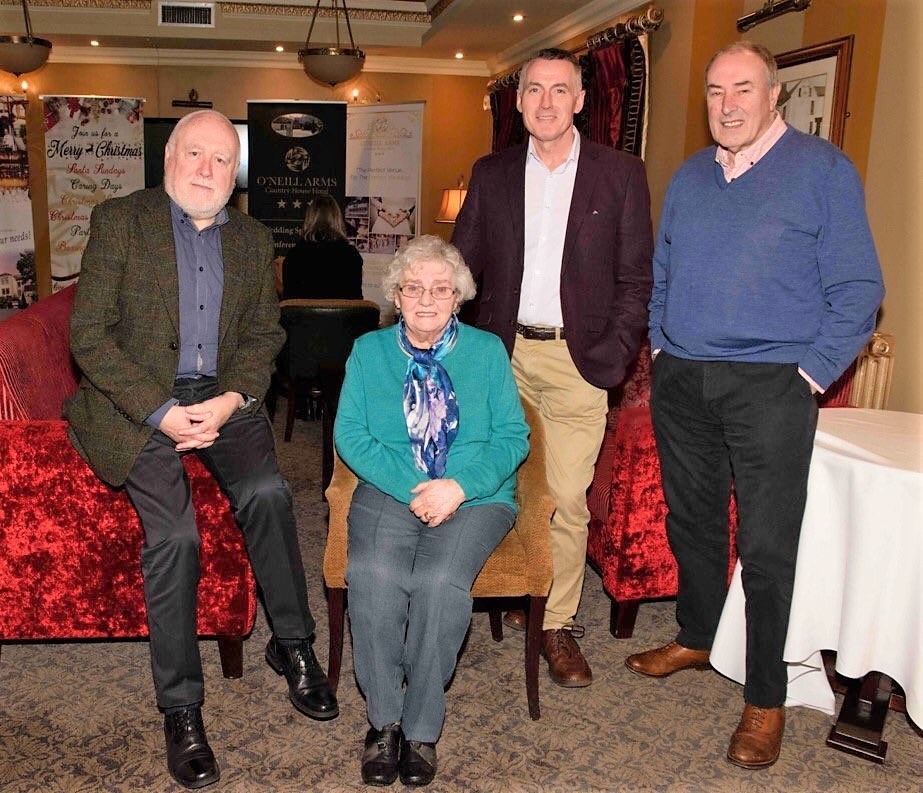
Citizens rights can no longer be put on hold.
We have come full circle.
The extremists within political unionism must not be allowed to hold back change.
The days of second class citizenship are over.
The post civil rights generations will never again be pushed to the back of the bus.
Fundamental change in relations between Ireland and Britain is now unavoidable.
Importantly, progressive and democratic alliances will also be required to persuade and convince a majority as to the desirability and achievability of an agreed, constitutional Irish national democracy, which guarantees a future for all our people based upon rights, respect and reconciliation.
A year of new challenges lies ahead in 2019.
Those aspiring for maximum change must remain focussed upon the bigger picture. There can be room for complacency.
The momentum for change must not relax.
Our's should be the last generation which has to campaign for democratic and national rights.
2019 needs to be a year of more and louder voices, greater advocacy, and increased popular mobilisation for democratic rights and change.
Let us all ensure that 2019 echoes to the clarion call of those iconic words...'We shall overcome'.




